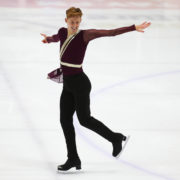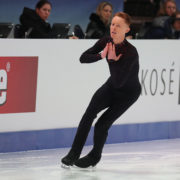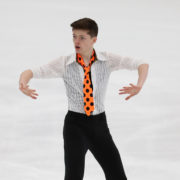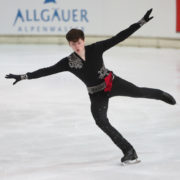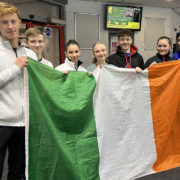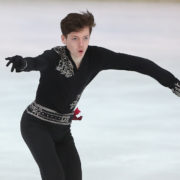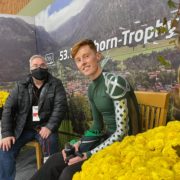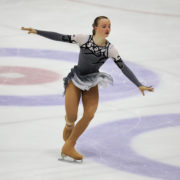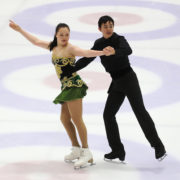Conor Stakelum: No Regrets As He Moves On From Competitive Skating
Last month, Conor Stakelum announced that he was retiring from competitive skating. The four-time European Championships Irish representative sat down for a chat to reflect on a career that has seen him serve as a pioneer for men’s figure skating in Ireland.
ISAI: As an athlete, timing when to retire is always tricky. What prompted you to make this decision?
Conor Stakelum: I was originally planning to continue for another season, but then I was thought about it and I didn’t really think I could achieve much more than what I had already done. I didn’t see that there was anything I could do that would make me feel more satisfied than how I already feel. There’s other things I would like to do with skating while I still can.
ISAI: How long did it take for you to make your mind up?
CS: I thought about it for about a week and then I spoke to my coaches, Simon (Briggs) and Debi (Briggs). We had a discussion about it and it was all very positive. They would have supported me either direction, if I decided to say or if I decided to stop. They trust me to know what’s best for myself and they’ll support me in that. I was a little bit sad. At the same time, it was my own decision. I think it’s actually a luxury as an athlete to retire on your own terms and have a positive feeling. I did everything I wanted to do.
ISAI: Let’s go back to where your journey in skating started. Did the young guy who began skating at a pop-up rink in Booterstown ever imagine having the career that you had?
CS: I had no concept of skating. I knew people on TV did skating and that was a bit different to what I was doing. I didn’t even think I would do a competition. I just enjoyed it. Everything carried on from there. I didn’t start and think ‘I want to go to the Olympics.’ To be fair, I never at any point in my career thought ‘I want to go to the Olympics’, because by the time I was aware of how you qualify for the Olympics, I thought I was probably not going to do that. The year that I went to the Junior Grand Prix in 2012 was the first time I had a concept of trying to get a score. I was trying to get the score for Junior Worlds. That was the first year where I felt like it would mean something big to me, not that it wasn’t a big thing before that to represent your country. That was the first time I had a thought that it would be an achievement if I could go to Junior Worlds. Obviously, I didn’t do that. Then I thought If I could go to Europeans, that would be big because I knew no (Irish) man had done it.
ISAI: You overcame a lot of obstacles throughout your career. You only started skating at the age of twelve. You had difficulties accessing training facilities. You had to balance life as an elite athlete while studying for a degree in microbiology.
CS: When I started Dundalk was open in Ireland and that was great. I probably wouldn’t have continued to skate if it was the situation that exists now. I wasn’t at a point where we would go to Belfast, because you’re not going to drive two and a half hours to do a single flip. Going to Dundalk was feasible. It was easy to go to the rink and it was a lovely facility. I had a really nice coach and lovely friends. It was just a pleasant environment, so obviously I did want to keep going. When that shut down in 2010, I could do a double Axel. I was acceptable as a skater and I wanted to keep skating. From there, it made sense to try and continue, but I didn’t really skate for about six months. I didn’t immediately go to Belfast. My start was not ideal. At the same time, I think the fact that I didn’t skate that much when I was young meant I’ve never had many issues with injury. I was able to go for quite a while. Even now, I don’t struggle with anything. Any injury I’ve ever had has been due to doing something stupid.
ISAI: What would you say was the highlight of your career?
CS: I would like to say it was going to Europeans in 2018 for the first time, but I actually didn’t enjoy that so much because I was so stressed. I would say my highlight was qualifying for Europeans by getting the (minimum technical) score at the preceding Nebelhorn Trophy in 2017. My favourite memory was getting the score in my free programme. If I got that score in my free programme now, I would cry for different reasons! At that point, it was that I got the score that I’d been struggling a lot to get. It was always possible. I had the short, not the free. The free should have been easy for me to get, but I would always pop two jumps or something like that and end up not getting the score or not do good spins or step out of things. There are other memories that are really good as well. Europeans this year. Europeans in Minsk (2019) was also a really nice memory. It was also beautiful seeing places that you just wouldn’t normally visit and to be able to combine that with the experience of representing your country is pretty cool. A lot of it was already unlikely that it would ever happen. Even the bits that were awful at the time, I don’t think of them as badly as I thought of them when they happened. They’re just funny. The things I thought were disasters, most of them I now find quite funny to tell as stories.
ISAI: What other moments stand out in your career?
CS: Competing on the Junior Grand Prix because I got to go to Lake Placid. I had never been to America before. Actually I’ve never been since! That was amazing. Also the Autumn Classic in Canada because (Yuzuru) Hanyu was in it and we were in the same group in the short programme. That was amazing. He was such a nice guy as well. I skated quite well so that makes it even a nicer memory. I got to meet Hanyu, and the place was so full with all the fans who were just fans of everybody as well. That was a brilliant event even though it was just a normal Challenger Series. I’ll always remember that one.
ISAI: You have said that you have done everything you wanted to do in competitive skating. Do you have any regrets?
CS: There are obviously things I would like to do if they were possible. I just was never going to go to the Olympics, but it was cool when my friends got to go. With the way Worlds work, I knew that I probably wasn’t going to get to go to Worlds. I’ve been close to the short programme score, but then the free, you need like 64 and the highest I’ve had was 55 clean. People might say I could add in this or add in that, but you have got to add them and do them perfectly. I didn’t really feel that was attainable for me. I wouldn’t say they were things I really wanted to do, because I never really fixated on them as a goal. Going to Europeans was my goal.
ISAI: What are your plans for the future?
CS: I am not completely finished with skating, so watch and see what I do next. I’m just finished with competing.
ISAI: What would be your one piece of advice for up and coming Irish skaters?
CS: My best piece of advice to any skater is to run your programmes. Focus on yourself and your own skating. Don’t try to compare yourself to everyone else and everyone you see on the TV. Try to make your own little improvements and enjoy the opportunities.
ISAI: Thank you Conor for representing Ireland so well. We are very proud of all you have achieved.
CS: Thank you! I never really would have done it without the support of the Association. I wouldn’t have known that it was possible. I watched Europeans on TV and I only saw people do triple Axels and quads. You just think everyone does quads and that’s what Europeans is for, but it’s not. It’s for all the countries in Europe if you are an acceptable standard or what the ISU deems an acceptable standard. If the Association hadn’t shown me how to get there, with all the support I’ve received over the years and all the competitions I was sent to, it wouldn’t have been possible. I want to thank Simon and Debi because they changed my skating completely. They put all the pieces together and, with all the support and advice over the past few years, they made things easier for not only me, but for the people I train with. It was a big thing as well to have such a great group of friends to train with who motivated each other and there was just a great environment, great atmosphere, great coaches. It was always enjoyable. Obviously I didn’t enjoy every day, but the whole experience was enjoyable because of everyone involved.
